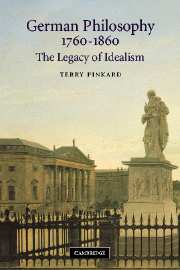Book contents
- Frontmatter
- Contents
- Acknowledgements
- List of abbreviations
- Introduction: “Germany” and German philosophy
- PART I KANT AND THE REVOLUTION IN PHILOSOPHY
- 1 The revolution in philosophy (I): human spontaneity and the natural order
- 2 The revolution in philosophy (II): autonomy and the moral order
- 3 The revolution in philosophy (III): aesthetic taste, teleology, and the world order
- PART II THE REVOLUTION CONTINUED: POST-KANTIANS
- PART III THE REVOLUTION COMPLETED? HEGEL
- PART IV THE REVOLUTION IN QUESTION
- Conclusion: the legacy of idealism
- Bibliography
- Index
1 - The revolution in philosophy (I): human spontaneity and the natural order
Published online by Cambridge University Press: 05 June 2012
- Frontmatter
- Contents
- Acknowledgements
- List of abbreviations
- Introduction: “Germany” and German philosophy
- PART I KANT AND THE REVOLUTION IN PHILOSOPHY
- 1 The revolution in philosophy (I): human spontaneity and the natural order
- 2 The revolution in philosophy (II): autonomy and the moral order
- 3 The revolution in philosophy (III): aesthetic taste, teleology, and the world order
- PART II THE REVOLUTION CONTINUED: POST-KANTIANS
- PART III THE REVOLUTION COMPLETED? HEGEL
- PART IV THE REVOLUTION IN QUESTION
- Conclusion: the legacy of idealism
- Bibliography
- Index
Summary
FREEDOM AND CRITICISM
Kant's first major book, The Critique of Pure Reason, rapidly became a key text in virtually all areas of German intellectual life in the last part of the eighteenth century. One key to understanding the enthusiasm surrounding the reception of this work is to be found in an essay by Kant published in 1784: “An Answer to the Question: ‘What is Enlightenment?’” In that essay Kant identified enlightenment with “man's release from his self-incurred immaturity (Unmündigkeit) … the inability to use one's understanding without the guidance of another.” Coming as it did in the wake of a growing sense of social, political, and cultural progress and improvement in Germany – indeed, in European life as a whole – and accompanied by a growing dissatisfaction (especially among educated young people) with the way things were and a sense that change was both required and imminent, Kant's words fell upon an audience already prepared to receive them. The age of “tutelage,” “immaturity” was over, like growing out of childhood: the illusions of the past were to be put aside, they could not be resurrected, and it was time to assume adult responsibilities. Moreover, this “immaturity” had not, in fact, been a natural state of mankind, but a “self-incurred” state, something “we” had brought on ourselves. On the question of what was needed to accomplish this, Kant made his views perfectly clear: “For enlightenment of this kind, all that is needed is freedom.”
- Type
- Chapter
- Information
- German Philosophy 1760–1860The Legacy of Idealism, pp. 19 - 44Publisher: Cambridge University PressPrint publication year: 2002

